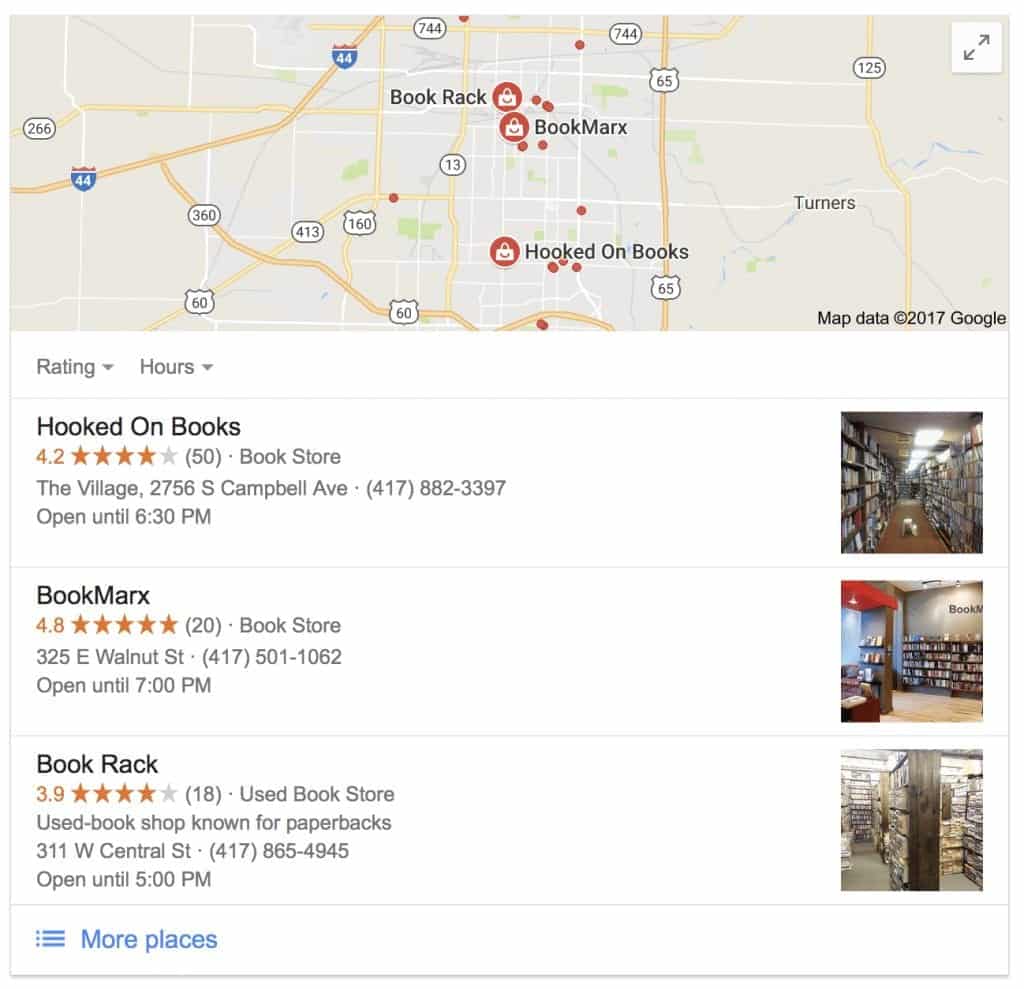Where are you? No seriously, where is your business located? Your physical place in the world and its proximity to people searching on Google is currently the most important ranking factor when it comes to local search pack results.
In some ways, this shouldn’t come as a surprise. It is called local search, after all. But it can feel shocking when you realize how little influence other important factors, like relevance and prominence, have when the searcher is far away from you. You could own the most beloved burger joint in town – five stars on Yelp, unparalleled hamburgers, award-winning fries, awesome website, adored by all – and still not show up in a 3-pack because you aren’t within the searcher’s radius and you’re competing with a dozen other burger joints that are closer to the searcher.
If you don’t think this makes much sense, you’re not alone. Google’s current emphasis on proximity for local search pack results is unsettling, whether you’re an Average Joe looking for the best burgers in town or a business that previously ranked in the 3-pack citywide. So today, to get a better grasp on this phenomenon, we’re exploring how proximity to a searcher can affect a business’s local search results.

Proximity and How it Relates to Search Results
Since the introduction of the algorithm update known as Possum, SEOs have noticed a significant increase in the importance of proximity as a ranking factor for local search pack results. If you didn’t know, a “pack,” which typically appears as a 3-pack, is a grouping of results that appears at the top of a search engine results page. It usually looks something like this:

Whitespark, a digital marketing company based in Edmonton, recently conducted a study of the influence of proximity on local search packs. Team members located in different parts of the city searched for the same terms, some simple keywords (ex: plumbers) and some geo-modified (ex: plumbers edmonton). Each person got completely different results within the 3-pack, and the results clustered around their unique location within Edmonton. The test clearly illustrated the importance of proximity.
Why not conduct a little experiment yourself? You might be surprised by the results. For example, try typing “restaurants” into Google. Do the best restaurants in your town make up the 3-pack? Or is the 3-pack composed of three restaurants that are very close to your location?
Is proximity the #1 ranking factor in local search pack results?
Yes. Although Google has not officially confirmed proximity’s uppermost importance when it comes to local search packs, a great amount of evidence supports this theory online. In fact, in Moz’s 2017 survey of local search ranking factors, the #1 result on the “Top 50 Local Pack Finder Factors” was “Proximity of Address to the Point of Search (Searcher-Business Distance).”
If you test this theory for yourself, you’ll find that for the majority of searches, proximity seems to be given more weight than any other factor. Even if other businesses are more relevant to your query or prominent online, they may be pushed out of the 3-pack by a lackluster business that’s right around the corner from you. Sometimes Google will even show a smaller pack (with just one or two results) instead of a full 3-pack if it feels the other options are too far away from the searcher.
All that said, proximity is likely not always the #1 ranking factor. We can’t be sure of it, and odds are another ranking factor sometimes takes the cake. In addition, proximity’s prominence doesn’t mean that it overshadows all other ranking factors. It is just one of many factors influencing your ability to rank highly in local search packs.
What other ranking factors play a part?
According to Whitespark, the other three most important ranking factors are proximity, relevance, and prominence. Proximity seems to restrict your results first. Google only considers results within a tight radius around the searcher, which varies in size depending on your location and query. Then, it looks at the prominence and relevance factors of businesses within that radius to decide which businesses deserve a spot in the 3-pack and which ranking they deserve. Businesses outside of the radius will not rank within the 3-pack (source).
The following factors can also influence your local search ranking:
- Content quality
- Links (linking domain authority, anchor text, linking domain quantity)
- Claiming your business on Google My Business
- On-page NAP (name, address, phone number)
- Keywords in titles
- Citations (citation volume, consistency of NAP with Internet Yellow Pages and aggregators)
- Reviews (review quantity, diversity, velocity)
Why does Google give proximity so much weight in local search?
Ultimately, we have to assume that Google believes that proximity ought to be the #1 ranking factor because it improves the user experience. Whether or not this is true is up for debate. As a searcher, do you typically want to find the nearest business to you or the best business? In most situations, you want the best. For example, when searching for a tax attorney, would you rather find the finest tax attorney in town or the one who’s a five-minute drive away? What about when you search for a dentist? How about a tattoo artist? Please do yourself a favor and choose a highly rated, reputable professional, not the first business to appear in Google. There are some exceptions, of course. For example, you might want to find the nearest business to you when searching for a gas station, a convenience store, a pharmacy, or an emergency service (a hospital, a tow truck, a locksmith, a 24/7 vet, etc.).
In addition, Google may have pushed proximity to the top of the list of ranking factors in order to sell more ads (source). After all, if organic local search packs are more exclusive and harder to get into, businesses might be willing to pay for an ad to ensure their spot. In addition, since there are now so many unique local packs within a city, Google has increased its inventory of ads to sell within local packs.
What does this mean for searchers?
As a searcher, it’s important to remember that the local search pack is not providing you with a list of the best businesses in the city. It’s simply ranking the best businesses within a search radius around your location. Although it’s certainly possible that the three best businesses are located nearby, it’s somewhat unlikely, especially if you live in a large city. Remember that the radius around you, the searcher, will influence your results, not the city in which you’re located. Also note that if you conduct a non-geo-modified search (“coffee shop,” for example, as opposed to “coffee shop springfield mo”), you can pull results from neighboring cities.
Localized organic listings (the results listed below the 3-pack) typically remain consistent no matter where you are located. So if you want to see which results come out on top when traditional ranking factors are taken into consideration, simply scroll past the local search pack.
How will this affect my business’s website?
For many SEOs, the significance of proximity may come as a frustrating revelation. You can’t easily change a business’s location, after all (and it would be silly to move your enterprise to an entirely new building in order to improve your ranking in local search packs). Because there is less real estate available to your business within local SEO, ranking has become more competitive. This is especially true for businesses that are located in large cities and fit within a high-density category (restaurants, fast food, coffee shops). Businesses that used to land in 3-packs across an entire city receive less exposure now.
While the emphasis on proximity is detrimental to many, it also provides more opportunities for smaller businesses hoping to gain traction within their neighborhood. If you’re just trying to get your foot in the door when it comes to establishing a presence for your business online and within your community, you might appreciate that proximity is currently valued so highly. It could help you compete with older, more prominent businesses in town.
Finally, if your business is located in a small city and/or fits within a low-density category, you might not notice any effects. When there aren’t many options that fit a searcher’s query, that person will receive a wider range of results across a vaster distance. For example, if I searched for “florist” in a tiny city with three florists, they would likely all appear within the 3-pack even if they were located quite far apart.
What can I do to improve my ranking?
Although you can’t achieve the impossible (ranking in the 3-pack when you’re outside of the searcher’s radius and competing with many other websites), you can still impact your ranking when you are placed in a local pack by improving your relevance and prominence. In addition, remember that you can still rank highly within localized organic results. To accomplish this, you will need to focus on Google Local ranking factors, like link signals (inbound anchor text, authority of the linking domain, quantity of linking domains, etc.) and on-page signals (keywords in titles, domain authority, presence of NAP, etc.). The following tips should also come in handy:
- Make your website as mobile-friendly as possible.
- Optimize your social media pages for local SEO.
- Target your competitors’ top keywords.
- Join applicable listing and review sites (like Yelp, TripAdvisor, BBB, Angie’s List, etc.).
- Try to get as many positive reviews on these sites as you can.
Why, you might wonder, should you spend time creating a page on a listing site and hoping for positive reviews? First of all, modern consumers are extremely influenced by online reviews. According to a study by the Pew Research Center, approximately half of consumers between the ages of 18 and 49 say that they routinely read online reviews before buying something for the first time. Second, if a Google search yields unhelpful results in the local 3-pack (perhaps because all the businesses located nearby are not very impressive), the searcher might turn to a review site to determine which gym, salon, or bookstore to try.


